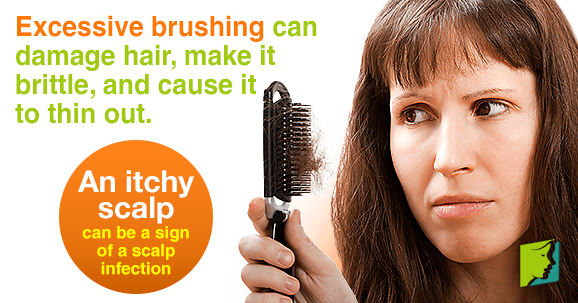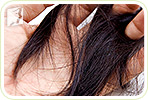For women, having an itchy scalp and thinning hair can be distressing symptoms, and this accumulated stress can often exacerbate both conditions. Keep reading below to learn more about itchy scalp and hair loss as well as effective tips on how to treat them for long-term relief.
Causes of Itchy Scalp and Hair Loss
Generally, hair loss during menopause is caused by hormonal imbalance of androgens with other reproductive hormones, such as estrogen and progesterone.
However, when hair loss is coupled with an itchy scalp, usually an underlying scalp infection is to blame, yet other conditions could be at fault as well.
The possible causes of an itchy scalp and hair loss include, but are not limited to:
Scalp ringworm. This fungal infection - also called tinea capitis - causes pus-filled bumps as well as an extremely itchy scalp and hair falling out in women of all ages.
Nerve problems. Itching and hair loss without signs of an infection or another skin reaction may indicate an underlying nerve problem, which could be due to damage, disease, or an abnormality. Diseases that affect the nerves can include shingles and diabetes.
Scarring hair loss. Also known as scarring alopecia, cicatricial alopecias, or alopecia cicatrisata, scarring hair loss is an inflammatory condition that destroys hair follicles, resulting in bare, smooth spots on the scalp that may be accompanied with severe itching, pain, and burning.
Thyroid disease. Thyroid diseases can often provoke a dry, itchy scalp and hair loss, causing the hair to thin or fall out in bald patches.
Scalp psoriasis. According to the American Academy of Dermatology, 50 percent of those suffering from plaque psoriasis also have psoriasis on their scalp1. Apart from dryness, consistent and intense itching can cause flaking and reddish patches that can lead to hair loss in those areas.
Folliculitis. Folliculitis is another inflammatory skin condition caused by a bacterial or fungal infection. It starts as red bumps around hair follicles that can turn into itchy, crusty sores. Severe cases can cause permanent hair loss and scarring.
Allergic reactions. Severe allergic reactions from hair care products can provoke an itchy scalp and hair falling out. One study found that up to one percent of women were allergic to a common ingredient found in dyes called paraphenylendiamine (PPD)2.
Treating the Symptoms
Treatment will depend upon the cause and extent of hair loss but could include the use of pharmaceuticals to reduce inflammation or combat yeast - like topical or oral steroids or antifungals - as well as medicated shampoos. More natural measures should not be pursued until the underlying cause has been properly identified.
In the meantime, it is essential women keep the following tips in mind to prevent further hair loss and aggravation of the scalp:
Avoid aggressive hair styling, such as brushing or using a heated straightener or curling irons.
Do not use chemical dyes and other harsh substances on the scalp.
Wear a hat or head scarf outside to protect the hair and scalp from UV damage or pollution.
For menopausal women whose dry, itchy scalp and hair loss is - indeed - caused by drastic hormonal fluctuations, natural and effective hair loss treatments may be pursued to encourage endocrine system health for optimal well-being.
Nevertheless, in all cases, it is crucial that women suffering from scalp itching and hair loss seek help from a board-certified dermatologist in order to properly diagnose the underlying cause and find an ideal solution.
Sources
- Cleveland Clinic. (2016). Do You Have an Itchy Scalp? 5 Common Problems and Fixes. Retrieved September 17, 2019, from https://health.clevelandclinic.org/itchy-scalp-5-common-problems-and-fixes/
- Mayo Clinic. (2018). Folliculitis: Symptoms & causes. Retrieved September 17, 2019, from https://www.mayoclinic.org/diseases-conditions/folliculitis/symptoms-causes/syc-20361634
- National Organization for Rare Disorders. (2016). Cicatricial Alopecia. Retrieved September 17, 2019, from https://rarediseases.org/rare-diseases/cicatricial-alopecia/
Footnotes:
- American Academy of Dermatology. (n.d.). Thyroid disease: A checklist of skin, hair, and nail changes. Retrieved September 17, 2019, from https://www.aad.org/public/diseases/other-conditions/thyroid-disease-checklist
- Ishida, W. et al. (2011). Severe Hair Loss of the Scalp due to a Hair Dye Containing Para phenylenediamine. ISRN Dermatology, 2011, 947284. doi: 10.5402/2011/947284




